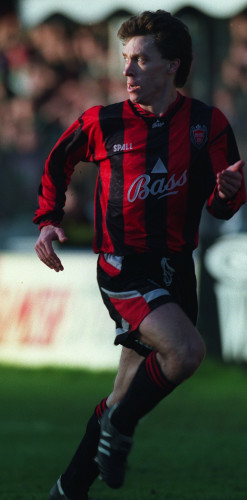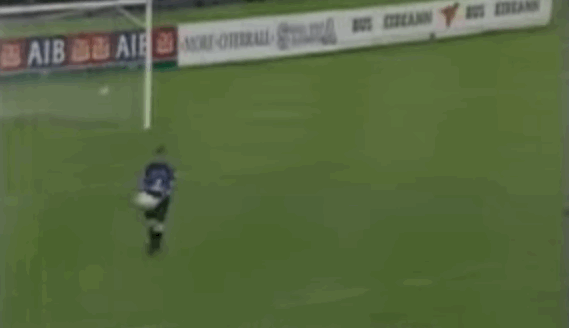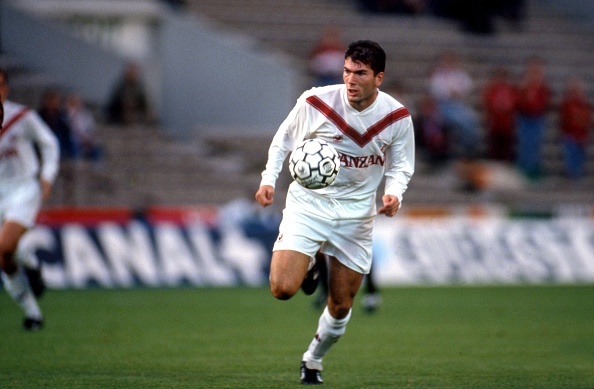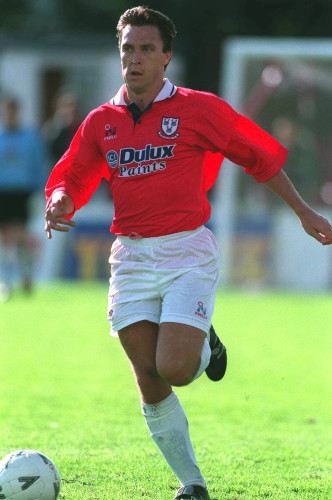SHOULD YOU EVER happen to find yourself seeking trading advice at Bank of Ireland’s premises on Burlington Road, there’s a strong possibility that the man providing it will also be in a position to offer an insight into what it’s like to share a pitch with one of the greatest footballers in living memory.
“Whenever I’m asked about my claim to fame, I tell people that I played against Zinedine Zidane when he had hair,” Dave Tilson laughs.
Nowadays he’s Bank of Ireland’s Head of Markets, but for an entire generation of supporters of one League of Ireland club, Tilson will forever be remembered as the left-sided attacker responsible for the goal that delivered success in the midst of a spell during which silverware was scarce.
His football career was ultimately cut short by injury, but Tilson’s transition out of the game was eased by the fact that he was already established in another profession. Throughout his time in the League of Ireland, he worked simultaneously in the financial sector. The foundations for a stable career that didn’t rely on his ability to kick a ball had been laid during his childhood in Ringsend.
“When I was growing up, people from Ringsend just didn’t go on to third-level education,” he explains. “It just wasn’t what was done. For whatever reason, I was always interested in a degree in commerce and that type of thing. My mother really pushed me in that direction, which was important.”
After Tilson was educated as a footballer locally at Cambridge Boys, a soccer scholarship to UCD gave him access to a degree which would shape his professional life. It also introduced him to the League of Ireland.
He describes his four years at UCD as “a great grounding”, and his progress with the college earned him a call-up to the Republic of Ireland youth team for games against Scotland and England.
Brian Kerr was interested in bringing him to St Patrick’s Athletic in the summer of 1989, but Tilson instead opted for Bohemians. UCD’s insistence on being paid a fee for the transfer resulted in a tribunal taking place before he could play for the Gypsies.
“It’ll seem like tiny money now, but the transfer fee was 6,250 Irish pounds, which would be the guts of about €9,000,” he says. “That was big money at the time.”
Tilson would eventually go on to achieve legendary status at Bohs, but his time at Dalymount Park began inauspiciously. Billy Young, who signed him from UCD, was sacked early in his first season. A mediocre league campaign was compounded by a shock defeat to non-league outfit St Francis in the semi-finals of the FAI Cup.
“Padraig O’Connor replaced Billy Young and one of the first things he did was drop me,” Tilson recalls. “I was in and out of the team then. The fans were thinking: ‘Fuck sake, we paid that amount of money for this lad and he’s useless.’
“It was a bit of a horrible start. I actually started getting a few games towards the end of the year and did really well, but then unfortunately we were beaten by St Francis in the FAI Cup, which was a disaster. That was probably my worst ever day on a football field.”
At the end of that season, Tilson and a group of friends travelled abroad to follow Ireland at the World Cup. With Jack Charlton’s side making it as far as the quarter-finals, his stay in Italy lasted longer than he anticipated. Initially the festivities threatened to set him back even further when he returned to Bohs, but there was a turning point on the horizon.
“Italia 90 was a fantastic trip,” he says. “As you can imagine, there was a lot of alcohol consumed. I came back and I wasn’t in great shape. I just wasn’t fit. Eamonn Gregg had taken over as manager but I still wasn’t in the team regularly. But then I got a slice of good fortune.
“Ollie Walsh got suspended after picking up another yellow card for kicking the ball away down in Waterford. That got me back into the team, I did well and I never looked back from there. That was when things really changed for me at Bohs.
“I remember hearing at the end of that year that if it wasn’t for Ollie getting the suspension, I was going to be loaned out to Kilkenny City. That could have been the beginning of the end. It’s funny how a small thing like that can turn things around.”
The highlight of that season for Tilson came at Turner’s Cross, where he scored a hat-trick to eliminate Cork City from the FAI Cup. Unfortunately for the Leesiders, they’d suffer even more costly cup woe at the hands of Tilson the following season.
When the teams met in the 1992 FAI Cup final at Lansdowne Road, it offered Bohemians an opportunity to end a long wait for silverware. The club’s list of major honours hadn’t been upgraded since their League Cup triumph of 1979.
The decider remained goalless until the 78th minute, when John Connolly’s kick-out was helped into Tilson’s path by Tommy Byrne and Pat Fenlon. Tilson lifted the ball over City goalkeeper Phil Harrington, Bohs held out to secure their fifth FAI Cup, and Tilson’s status as a club legend was sealed a few days before his 24th birthday.
“It’s definitely my most valued achievement and it’s what people associate me with first and foremost,” he says. “The memory of scoring the winner at Lansdowne Road is obviously something special to have. It had been a long time since Bohs won a major trophy so I suppose it’ll always be my little piece of history.
“I’d had a chance earlier in the game but took a really heavy touch and Phil Harrington came out and saved it. For the goal, I remember telling myself in my mind that there was no way I was going to make the same mistake twice. Phil raced off his line and I hit it early. My memory of it is still crystal clear.
“I remember we had great craic the following day. We all went to the Mansion House and the Cork lads were there as well. After that we all went back to O’Donoghue’s on Merrion Row. This was about 3.30pm on a Monday afternoon. We all had brilliant craic together. It’s probably hard to imagine that happening nowadays.
“Gerry McCabe from Cork actually robbed the cup! Their bus pulled outside O’Donoghue’s as they were getting ready to head home, and there was McCabe at the front with the cup. They were a great bunch of lads, and I suppose they got their revenge the following year.”
Without a Premier Division title in 15 years, Bohs only needed a draw away to Dundalk on the final day of the 1992-93 season to clinch the title. However, it turned out to be a miserable day for Eamonn Gregg’s side. Dundalk’s Tom McNulty scuppered their plans with the only goal of the game, but things began to go awry even before Bohs arrived at Oriel Park.
Tilson explains: “We got as far as Whitehall church and the bus broke down. We were hanging around there for ages and ages, waiting for it to get sorted. I remember my brother passing in a car, looking at us and wondering what the hell was going on. It was a disaster.
“When we got to Oriel Park, Enda McGuill came into the dressing room, shouting ‘get ready now, the game is kicking off in five minutes!’ and Eamonn Gregg nearly ran at him to throw him out. Everything was just frantic. We didn’t have time for a proper warm-up or anything like that. It was far from an ideal way to prepare for a game of that importance.
“As for the game itself, it just didn’t go for us. Someone actually sent me the highlights of it recently and I had a look back at them. We probably had three decent penalty claims which weren’t given. Tom McNulty whacked a shot into the bottom corner and that was that.
“It’s funny looking back, but Martin Lawlor — who I knew — was playing for Dundalk and I remember him actually saying on the pitch during the game: ‘Come on, Tillo. What are you guys at? Jesus, you can win the league here, get yourselves going!’ But we never did.”
Had goal difference been used to separate teams who finish level on points, as is now customary, then Bohs would have been crowned champions irrespective of their defeat to Dundalk. Instead they were preparing for a three-way play-off against Shelbourne and Cork City. Conducted as a round-robin series, all three clubs finished level once again. A second series was subsequently required, at the end of which Cork were at the top of the pile.
“After throwing away a league title in the manner that we did, it was always going to be difficult to recover and go again for the play-offs,” says Tilson. “That was the only year that I really came close to winning a league. Twenty-five years later, it still rankles that there’s not one on the CV.”
If there was a silver lining for Bohemians, it came in the form of a Uefa Cup first-round tie the following season against a Bordeaux outfit who topped the standings in France when they came to Dalymount Park. Included in that side were future World Cup winners Bixente Lizarazu, Christophe Dugarry and a 21-year-old playmaker by the name of Zinedine Zidane.
“Zidane was incredible. Absolutely majestic,” says Tilson, who played against him again two years later when Bohs and Bordeaux were reunited in the Intertoto Cup. “It was impossible to get near him when he had the ball. At the time no one had heard of him beyond France, although Eamonn Gregg had flagged him in advance as being probably their main threat. You could see almost instantly how special he was.”
There was a sense of missed opportunity in the Bohs camp after their 1-0 defeat to Bordeaux in Dublin. Dugarry scored the only goal of the game, but Tommy Fitzgerald squandered a glorious chance and Tony Cousins hit the crossbar. Nevertheless, the French side coasted through to the next round with a 5-0 win in the second leg.
Tilson: “I remember thinking afterwards that, say for argument’s sake, had we been awarded a 10-0 win for the game in Dalymount, they could probably have beaten us 11-0 in the second leg if they needed to. They were a really brilliant side. Playing against guys of that pedigree is a great memory to have.”
In the autumn on 1995, as Tilson was embarking on his seventh season as a Bohemians player, his time with the club came to an end. When Bohs — who were then under the managerial stewardship of Turlough O’Connor — secured the signing of Brian Mooney from Shelbourne, Tilson moved in the opposite direction shortly afterwards.
“Ollie Byrne [Shelbourne owner], in his own inimitable style, found something in the rulebook which suggested that Shels were owed something for Brian,” Tilson recalls. “It was a pity, because Brian was going to play on the right for Bohs and I was going to play on the left, which was something I was looking forward to.
“Ollie asked me would I be interested in going to Shels, and while I loved my time at Bohs, I wouldn’t have been Turlough O’Connor’s favourite player and he wouldn’t have been my favourite manager either. So when it turned into what was essentially a swap deal, it probably made a bit of sense.”
With a premature end to his career on the horizon, Tilson’s spell at Shels was relatively brief. At the end of his first season, he was part of the side that defeated St Patrick’s Athletic after a replay to win the FAI Cup.
By the time they retained it 12 months later, Tilson — at the age of 28 — had already played his last competitive game of football. He was still a member of the squad when Shels got the better of Derry City in the ’97 decider at Dalymount Park, but as injuries took their toll, he had to settle for watching from the stands.
“Winning the cup with Shels, it just wasn’t the same as it was at Bohs, if I’m honest,” he says. “In 1992 I was the main man after scoring the goal, but I certainly wasn’t in ’96. It was great to win it but it felt a bit different.
“I missed the final the following year as I was having a lot of issues with my groins at that stage. Sports science wasn’t really a thing then so there were people who thought it was all in my head.
“My groins would be killing me after half an hour of a game or training, to the extent that I’d no longer be able to run. Two days later I’d be feeling brand new again, but the process repeated itself as soon as I played or trained.
“It took about 12 months before it was figured out what it was. It turned out to be an issue with my pubic bone, where there was bone-on-bone chafing which was causing severe pain and inflammation.
“My own job was also becoming a little bit of an impediment to me. The number of midweek matches was increasing and logistically it became very difficult. I was having to take a half-day at work quite regularly to travel around the country for matches.
“With the injury, I was told there was an operation in London which may — or may not — have solved it, but at that stage I was nearly 29 and I had been finding it tough. The alternative was to rest it for 18 months, which is what I did. I went back with Shels for about three months in 1998, got myself up to a bit of fitness, played a few reserve team matches but the problem resurfaced again. And that was it for me.
“I won’t say I had fallen out of love with football, but by then I had spent a lot of time sitting in the stands because of the injuries. As a result, I was happy enough to walk away when I did. I probably only started missing it when I went back playing again.”
He adds: “After doing nothing for about seven years, I joined an Over 35s team in Ballsbridge. Fifteen years later I’m still going at the age of 50 and I haven’t had any issues. Apparently seven years of drinking beer and doing nothing was the solution!”
When assessing Dave Tilson’s career, it’s perhaps surprising that it didn’t include a stint in the UK. There was interest — particularly around the time of his cup final heroics in 1992 — from the likes of Stoke City, Everton and Middlesbrough. A move ultimately never materialised, and Tilson insists he was indifferent to the prospect nevertheless.
He says: “I remember Lou Macari [Stoke manager] coming over for one game on a Bank Holiday Monday, but I often had problems with my hamstrings so I didn’t play in the game and nothing more came of it. Being honest, the attraction of England was much different then to what it is now. The rewards were nowhere near as great.
“As well, I always remember playing a game for the Ireland youths against the Manchester United youths at their old training ground at The Cliff. John Clarke was with us and he was at Manchester City at the time. His parents came over to watch the game and I remember later when they were leaving him at the bus stop, he was in tears.
“I think he was 16 at the time. They were going back to Ireland and he might not have seen them again for another few months. It’s different now obviously, but back then you probably only got home at Christmas and in the summer. That kind of thing definitely had an impact on me.
“There was also the fact that I didn’t think I was good enough. Even if I had gone over, I wasn’t sure I’d make it. I had a decent job at home already so it wasn’t really a big deal for me. With the rewards nowadays, I’d love to give it a crack. But it was just so different back then.”
The 1992 #Bohs FAI Cup-winning team being honoured at half-time tonight. 🏆🔴⚫ pic.twitter.com/FqDOE3W52k
— Bohemian FC 🔴⚫ (@bfcdublin) October 27, 2017
After ensuring that his involvement in football was never to the detriment of his prospects of maintaining a successful career in the financial sector, Tilson is understandably an advocate of the importance of balancing education with sporting ambition.
In spite of his own experiences, however, he’s reluctant to lecture young players about the potential benefits of postponing their plans to break into the professional game until there’s a safety net in place.
“It’s easy for me to say ‘focus on your studies’ or whatever, but the rewards in football now are so enormous that it’s never going to be a straightforward decision,” says the father of three. “I know the reality is that a very small percentage of players get to that level where the rewards are so huge, but you’ll probably always regret it if you don’t go for it.
“I don’t have any regrets about maybe not going for it myself, and obviously the ideal scenario is to have an education to fall back on, but given what’s at stake these days, why wouldn’t you give it a proper go?”




